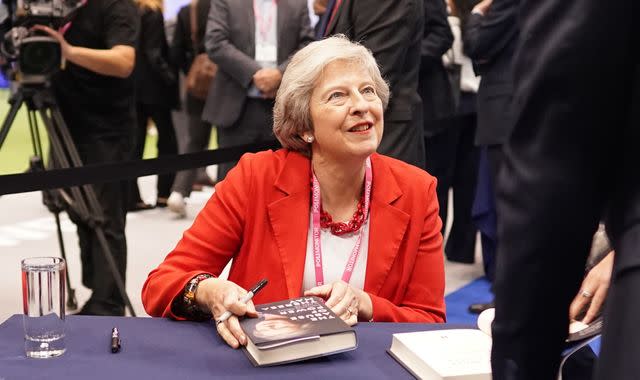Former prime minister Theresa May to stand down as MP at next general election

Former prime minister Theresa May has announced she will stand down as an MP at the next general election.
In an exclusive statement to her local paper, Mrs May said she had taken the "difficult decision" to quit the Commons after 27 years representing her Maidenhead constituency.
The 67-year-old also pledged her support to Rishi Sunak's government and said she believed the Conservatives could win the next election.
Politics latest: May joins Tory exodus from parliament
Elected seven times, Mrs May has been the Conservative MP for the Berkshire seat since 1997.
She served as prime minister from 2016 to 2019, having previously held the position of home secretary since 2010.
Mrs May entered Downing Street after David Cameron resigned after the country voted to leave the European Union - something he campaigned against.
However, the fateful choice of the "new Iron Lady" to call a snap election and the Brexit chaos that followed saw her forced out of the job three years later.
Mrs May's decision to leave Westminster adds to an exodus that has seen more than 60 Tory MPs say they will not fight their seats at the next election - the highest total since 1997.
High profile MPs who have said they will quit include former cabinet ministers Ben Wallace, Sajid Javid, Dominic Raab and Kwasi Kwarteng.
Read more: When could the next general election be?
In a statement to the Maidenhead Advertiser, the Conservative politician, a vicar's daughter known for her fashionable footwear, said: "It has been an honour and a privilege to serve everyone in the Maidenhead constituency as the Member of Parliament for the last 27 years.
"Being an MP is about service to one's constituents and I have always done my best to ensure that I respond to the needs of local people and the local area.
"Since stepping down as prime minister I have enjoyed being a backbencher again and having more time to work for my constituents and champion causes close to my heart including most recently launching a Global Commission on Modern Slavery and Human Trafficking.
"These causes have been taking an increasing amount of my time.
"Because of this, after much careful thought and consideration, I have realised that, looking ahead, I would no longer be able to do my job as an MP in the way I believe is right and my constituents deserve.
"I have therefore taken the difficult decision to stand down at the next general election."
She added: "I will continue to work hard for all my constituents until the general election.
"As I pass the baton on I will be working with my successor to secure a Conservative victory in Maidenhead. I remain committed to supporting Rishi Sunak and the government and believe that the Conservatives can win the election.
"I would like to thank all those who chose me to represent them as their member of parliament.
"I have always said there is no greater privilege than being an MP; I have served as home secretary and prime minister but none of that would have been possible without the people of Maidenhead and the constituency which I have been proud to call my home."
Read more from Sky News:
Sunak quashes speculation of May general election
Corbyn allies snub Galloway's plea for political pact
Labour Party chair Anneliese Dodds said the number of Tories standing down showed there is "no confidence" in Mr Sunak and the Conservatives' electoral prospects.
But Treasury minister Gareth Davies rejected this, telling Sky News he was "personally sad" to see Mrs May stand down "after a pretty good innings", but it was "completely reasonable" for people to decide to leave parliament ahead of an election.
He said: "Each one has made their own decision for personal reasons and I respect every single person's decision to do so."
👉 Listen above then tap here to follow Electoral Dysfunction wherever you get your podcasts 👈
Mrs May arrived in Downing Street in 2016, after an uncontested leadership election, faced with the task of bringing together party and country after the traumas of the EU referendum.
But her decision to call an early election in the hope of securing the comfortable majority she needed to implement her Brexit plans ended in disaster.
A poorly received manifesto and hastily withdrawn social care policy, which saw her insist "nothing has changed", coupled with a robotic campaigning style, saw her deprived her of her slim majority in the Commons and dependent on the Democratic Unionist Party (DUP).
From then on she was engaged in a day-by-day struggle to keep her plans on course and maintain the fragile unity of her government.
That year's conference in Manchester ended in humiliation as she was handed a P45 by a comedian on stage, lost her voice to a persistent cough and ended her speech with letters falling off the backdrop behind her.
After repeated failed attempts to get her Brexit plans through and with the party in open mutiny, her fate was sealed.
Nicknamed the Maybot, for rarely revealing her emotions, Mrs May fought back tears as she announced her departure from Number 10 in May 2019, expressing her gratitude "to have had the opportunity to serve the country I love".
Unlike many other former prime ministers, Mrs May remained in parliament and active on the backbench, not afraid to criticise the government.


